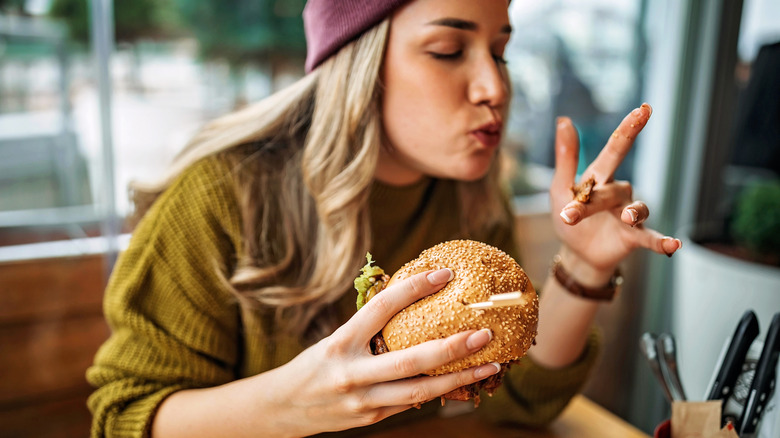The Unexpected Reason You're A Really Fast Eater
More often than not, when we come across a particularly fast eater, we make a joke about their eating habits and ask them not to inhale their food. Eating your food mindfully and slowly has been shown to increase the pleasure of eating. You taste your food better and inhale the aromas, which, according to science, also contributes to how your food actually tastes. But science has long wondered about the phenomenon of eating too fast, and according to new research, why some people are faster eaters than others might have to do with their order of birth and how many siblings they had growing up.
According to a 2021 study published in Clinical Obesity, firstborn children are two times more likely to eat faster than others. The study, which looked at the relationship between the number of siblings and eating rate, also found that the higher the number of siblings in a family, the faster the eating rate. Furthermore, only children ate at a slower pace than those who had two or more siblings. What this could mean, according to Psychology Today, is that firstborns with several siblings had perceived (or actual) competition for their food. It could also mean that siblings were simply trying to match the eating speed of everyone else at the table.
Inhaling your food — without actually tasting it — has been linked to several other reasons, too.
Habit, distractions, or your relationship with food could influence eating pace
Bar the obvious reasons like being very hungry or wanting to eat fast so you can get out the door for an important appointment, habits can also influence how we eat.
As explained by licensed dietitian, intuitive eating counselor, and Nutrimsa founder Kara Bolon, the habit of fast eating could have developed years ago when we were kids or "may have formed recently in adulthood, especially when combined with other triggers like eating while distracted or mirroring the speed of the person or people you typically eat with."
Distractions (like TV shows or being engaged in group conversation) can also cause you to eat fast. Certified eating psychology coach, culinary nutritionist, and author Jenny Eden Berk shared that your relationship with food can also influence the rate at which you eat. "If we've been told our whole lives that certain foods are good and some foods are junk or will make you sick, then what does it say about us when we consciously choose to eat those maligned foods? It creates cognitive dissonance in us and one way to remedy this is to eat it super fast, standing up, and alone so no one can witness it," she explained. While changing your relationship with food may involve tracing back to unhealthy messaging you may have received as a child and rewriting those, the other reasons for eating fast could be rectified by following some simple steps.
What eating fast can do to your health and how to stop
Eating your food at an increased speed consistently has been linked with a greater obesity risk, per a study that analyzed information on patients with diabetes from 2008-2013. According to psychologist and section head for psychology in Cleveland Clinic's Center for Behavioral Health Department of Psychiatry and Psychology, Leslie Heinberg, who commented on the study (via Cleveland Clinic), "People who were slowest eaters had the lowest risk of obesity. People who self-described as medium-eaters had a bit higher risk, but the highest risk was in the fast-eating group."
Eating fast has also been linked with poor digestion, feeling bloated, insulin resistance, metabolic syndrome, and type 2 diabetes, according to Healthline.
There are many ways to slow down your eating pace, and using your non-dominant hand to eat is one effective method, according to intuitive eating coach and TikToker Alex Joy Pucci. Did you know that swapping your regular white plate with a red one could also tell your brain to slow down while eating? According to a 2012 study, the color of utensils influences how we eat as well. Other tricks to try include switching off the TV during meal times and sipping water in between to help break up the process. Aiming to chew your food anywhere between 15 and 30 times can also help, according to Heinberg. Ultimately, the goal of mindful eating is to actually savor your food and to avoid any possible health problems that could arise from overeating.


